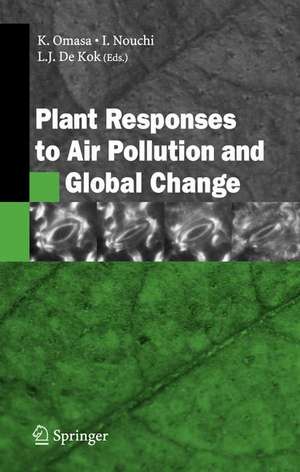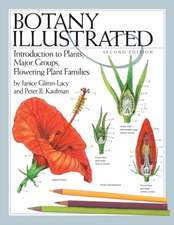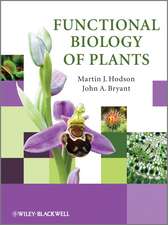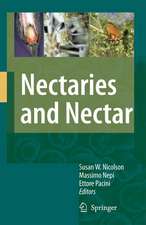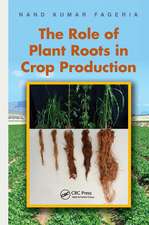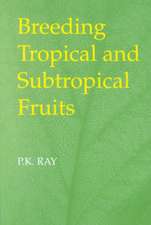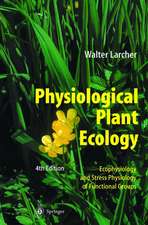Plant Responses to Air Pollution and Global Change
Editat de Kenji Omasa, Isamu Nouchi, Luit J. De Koken Limba Engleză Hardback – 20 mar 2006
| Toate formatele și edițiile | Preț | Express |
|---|---|---|
| Paperback (1) | 1218.06 lei 43-57 zile | |
| Springer – 15 noi 2014 | 1218.06 lei 43-57 zile | |
| Hardback (1) | 1224.36 lei 43-57 zile | |
| Springer – 20 mar 2006 | 1224.36 lei 43-57 zile |
Preț: 1224.36 lei
Preț vechi: 1493.13 lei
-18% Nou
Puncte Express: 1837
Preț estimativ în valută:
234.36€ • 254.65$ • 196.99£
234.36€ • 254.65$ • 196.99£
Carte tipărită la comandă
Livrare economică 21 aprilie-05 mai
Preluare comenzi: 021 569.72.76
Specificații
ISBN-13: 9784431310136
ISBN-10: 4431310134
Pagini: 324
Ilustrații: XVIII, 300 p.
Dimensiuni: 155 x 235 x 25 mm
Greutate: 0.64 kg
Ediția:2005
Editura: Springer
Colecția Springer
Locul publicării:Tokyo, Japan
ISBN-10: 4431310134
Pagini: 324
Ilustrații: XVIII, 300 p.
Dimensiuni: 155 x 235 x 25 mm
Greutate: 0.64 kg
Ediția:2005
Editura: Springer
Colecția Springer
Locul publicării:Tokyo, Japan
Public țintă
ResearchDescriere
The main force behind climate change is the elevated concentration of CO2 in the at mosphere. Carbon dioxide and air pollutants come mostly from the same industrial sources and diffuse globally, so that air pollution is also part of global change in the pre sent era. The impacts on plants and plant ecosystems have complex interrelationships and lead to global change in a circular manner as changes in land cover and atmospheric and soil environments. Plant metabolism of CO2 and air pollutants and their gas fluxes in plant ecosystems influence the global gaseous cycles as well as the impacts on plants. The 6th International Symposium on Plant Responses to Air Pollution and Global Changes was held at the Tsukuba Center for Institutes and Epochal Tsukuba, in Tsukuba, Japan, October 19-22, 2004. The aim of the symposium series is to bring together scien tists of various disciplines who are actively involved in research on responses of plant metabolism to air pollution and global change. The previous symposia were held in Ox ford, UK, 1982 (1st), in Munich, Germany, 1987 (2nd), in Blacksburg, USA, 1992 (3rd), in Egmond aan Zee, The Netherlands, 1997 (4th), and in Pulawy, Poland, 2001 (5th).
Cuprins
Preface by Kenji Omasa, Isamu Nouchi and Luit J. De Kok Contributors Plant Responses to Air Pollution: Metabolism of atmospheric sulfur gases in onion.- Impact of atmospheric NH3 deposition on plant growth and functioning – a case study with Brassica oleracea L..- How sensitive are forest trees to ozone? - New research on an old issue.- Northern conditions enhance the susceptibility of birch (Betula pendula Roth) to oxidative stress caused by ozone.- Physiological responses of trees to air pollutants at high elevation sites.- Complex assessment of forest condition under air pollution impacts.- Evaluation of the ozone-related risk for Austrian forests.- Causes of differences in response of plant species to nitrogen supply and the ecological consequences.- Plant Responses to Climate Change: Long-term effects of elevated CO2 on sour orange trees.- Plant responses to climate change: impacts and adaptation.- Effects of elevated carbon dioxide concentration on wood structure and formation in trees.- Plant Responses to Combination of Air Pollution and Climate Change: Carbon dioxide and ozone affect needle nitrogen and abscission in Pinus ponderosa.- Effects of air pollution and climate change on forests of the Tatra Mountains, Central Europe.- Genetics and Molecular Biology for Functioning Improvement: MAPK signalling and plant cell survival in response to oxidative environmental stress.- Expression of cyanobacterial ictB in higher plants enhanced photosynthesis and growth.- Improvement of photosynthesis in higher plants.- Modification of CO2 fixation of photosynthetic prokaryote.- Specificity of diatom Rubisco.- Regulation of CO2 fixation in non-sulfur purple photosynthetic bacteria.- Experimental Ecosystem and Climate Change Research: Experimental ecosystem and climate change research in controlled environments:lessons from the Biosphere 2 Laboratory 1996-2003.- Importance of air movementfor promoting gas and heat exchanges between plants and atmosphere under controlled environments.- Pros and cons of CO2 springs as experimental sites.- Global Carbon Cycles in Ecosystem and Assessment of Climate Change Impacts: Carbon dynamics in response to climate and disturbance: Recent progress from multi-scale measurements and modeling in AmeriFlux.- Synthetic analysis of the CO2 fluxes at various forests in East Asia 3-D remote sensing of woody canopy height and carbon stocks by helicopter-borne scanning lidar.- Assessments of climate change impacts on the terrestrial ecosystem in Japan using the Bio-Geographical and GeoChemical (BGGC) Model.- Air Pollution and Global Change in Asia: Establishing critical levels of air pollutants for protecting East Asian vegetation – A challenge.- Major activities of acid deposition monitoring network in East Asia (EANET) and related studies.- Land degradation and blown-sand disaster in China.- Impact of meteorological fields and surface conditions on Asian dust.- A case study on combating desertification at a small watershed in the hills-gully area of loess plateau, China.- A recipe for sustainable agriculture in drylands.- Index
Caracteristici
Reviews current topics on plant metabolism of air pollutants and elevated CO2
Discusses the responses of whole plants and plant ecosystems
Explores genetics and molecular biology for functioning improvement
Includes research in Europe, the United States, Australia, and East Asia
Discusses the responses of whole plants and plant ecosystems
Explores genetics and molecular biology for functioning improvement
Includes research in Europe, the United States, Australia, and East Asia
